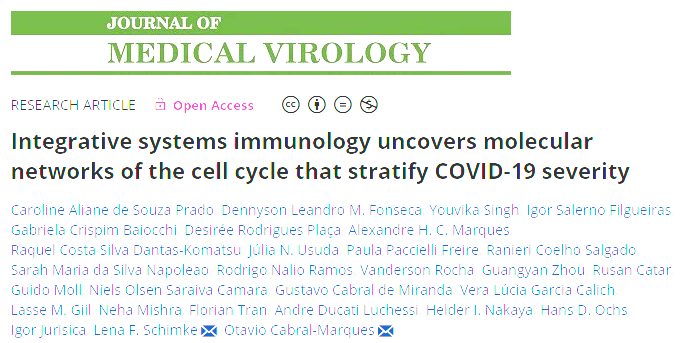Integrative systems immunology uncovers molecular networks of the cell cycle that stratify COVID-19 severity
Several perturbations in the number of peripheral blood leukocytes, such as neutrophilia and lymphopenia associated with Coronavirus disease 2019 (COVID-19) severity, point to systemic molecular cell cycle alterations during severe acute respiratory syndrome coronavirus-2 (SARS-CoV-2) infection. However, the landscape of cell cycle alterations in COVID-19 remains primarily unexplored. Here, we performed an integrative systems immunology analysis of publicly available proteome and transcriptome data to characterize global changes in the cell cycle signature of COVID-19 patients. We found significantly enriched cell cycle-associated gene co-expression modules and an interconnected network of cell cycle-associated differentially expressed proteins (DEPs) and genes (DEGs) by integrating the molecular data of 1469 individuals (981 SARS-CoV-2 infected patients and 488 controls [either healthy controls or individuals with other respiratory illnesses]). Among these DEPs and DEGs are several cyclins, cell division cycles, cyclin-dependent kinases, and mini-chromosome maintenance proteins. COVID-19 patients partially shared the expression pattern of some cell cycle-associated genes with other respiratory illnesses but exhibited some specific differential features. Notably, the cell cycle signature predominated in the patients' blood leukocytes (B, T, and natural killer cells) and was associated with COVID-19 severity and disease trajectories. These results provide a unique global understanding of distinct alterations in cell cycle-associated molecules in COVID-19 patients, suggesting new putative pathways for therapeutic intervention
Authors
Prado CAS, Fonseca DLM, Singh Y, et al.
External link
Publication Year
Publication Journal
Associeted Project
Integrative Biology
Lista de serviços
-
StructRNAfinder: an automated pipeline and web server for RNA families prediction.StructRNAfinder: an automated pipeline and web server for RNA families prediction.
-
CEMiTool: a Bioconductor package for performing comprehensive modular co-expression analyses.CEMiTool: a Bioconductor package for performing comprehensive modular co-expression analyses.
-
webCEMiTool: Co-expression Modular Analysis Made Easy.webCEMiTool: Co-expression Modular Analysis Made Easy.
-
Assessing the Impact of Sample Heterogeneity on Transcriptome Analysis of Human Diseases Using MDP Webtool.Assessing the Impact of Sample Heterogeneity on Transcriptome Analysis of Human Diseases Using MDP Webtool.
-
Predicting RNA Families in Nucleotide Sequences Using StructRNAfinder.Predicting RNA Families in Nucleotide Sequences Using StructRNAfinder.
-
OUTBREAK: a user-friendly georeferencing online tool for disease surveillance.OUTBREAK: a user-friendly georeferencing online tool for disease surveillance.
-
Noninvasive prenatal paternity determination using microhaplotypes: a pilot study.Noninvasive prenatal paternity determination using microhaplotypes: a pilot study.
-
Editorial: User-Friendly Tools Applied to Genetics or Systems Biology.Editorial: User-Friendly Tools Applied to Genetics or Systems Biology.
-
Automatic detection of the parasite Trypanosoma cruzi in blood smears using a machine learning approach applied to mobile phone imagesAutomatic detection of the parasite Trypanosoma cruzi in blood smears using a machine learning approach applied to mobile phone images
-
Tucuxi-BLAST: Enabling fast and accurate record linkage of large-scale health-related administrative databases through a DNA-encoded approachTucuxi-BLAST: Enabling fast and accurate record linkage of large-scale health-related administrative databases through a DNA-encoded approach
-
Ten quick tips for harnessing the power of ChatGPT in computational biologyTen quick tips for harnessing the power of ChatGPT in computational biology

